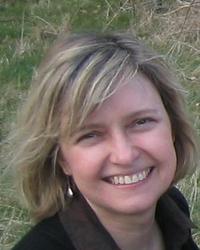Announcing Kim England, Harry Bridges Endowed Chair in Labor Studies
The Harry Bridges Center for Labor Studies is proud to welcome Kim England, Professor of Geography at the University of Washington, as the Harry Bridges Endowed Chair in Labor Studies (2018-2020). Endowed in 1992, the Bridges Chair guides the Center’s mission to further the study and research of labor and society, inform policymakers, and galvanize students to be actors in the labor movement. The ninth University of Washington professor to hold the Bridges Chair, Professor England is the first geographer and the first whose research and teaching centers on women and caring labor.
Originally from the United Kingdom, Kim completed her undergraduate degree at the University of Leicester, and subsequently went on to complete her MA and PhD in Geography at the Ohio State University. Since coming to the University of Washington in 1999, she has continued to pursue her interests in feminist, economic, social and political geographies through teaching and research. Kim’s research, including work funded by the Bridges Center, focuses on the relationships between care, paid work and the home, and the interconnections between inequalities, social reproduction and the state. She explores the shifting contours of care work, welfare, and the meanings of home associated with neoliberal social policy reforms.
Kim’s long standing interest in labor, work and employment stems from her own personal history and geography. She was born in Wallsend, a town on the River Tyne in Northeast England, with a long history of coal-mining and ship-building. She grew up in a time when jobs in those industries were declining, and was privy thus to the struggles of family and friends whose livelihoods were disappearing. She remarks, “As a girl, I knew those jobs weren’t open to me anyway, but I was mindful of what this meant for the local economy and everyday life, and saw the ways unions fought to keep jobs and protest deteriorating working conditions.” Upon moving to the United States to go to graduate school, Kim found her intellectual home: studying the social and spatial differentiations of women’s experiences in paid work, politics, and community in different places.
Kim remarks, “I recoiled at descriptions of women workers as helpless pawns, of being too dim-witted to realize they were being exploited by ‘capitalists’ – that simply didn’t describe the strong women in my extended family, and none of the actual flesh-and-blood women of my acquaintance.” The central focus of Kim’s academic career has been a commitment to position women as knowledgeable agents, particularly through her research on pink collar work, strategies for combining paid work with caregiving, and activism over working conditions. “Geography matters, as geographers are fond of saying,” she notes, “including making us who we are.” As someone who hails from a proud working class community in the North of England, she will continue to bring this dedication to labor and activism in her research, advocacy, and leadership as Harry Bridges Chair.
Kim’s past work with the Bridges Center, representing over a decade of critical and interdisciplinary research, has regularly produced opportunities for community engagement. From 2006 to 2009, she co-led a Center-funded working group on Race, Class and Work-life Balance, which produced an academic conference, community events, and additional interdisciplinary research to study how race, ethnicity and class shape individuals’ and families’ ability to balance work and care responsibilities. She continued this work in 2014, receiving a Bridges Center Washington State Labor Research Grant focused on family friendly workplace practices and employment policy. One of Kim’s current projects, also funded by a Bridges Center Washington State Labor Research Grant, focuses on domestic worker's advocacy in Seattle. She seeks to analyze this growing effort for labor rights among Washington's domestic workers, in particular the push for a Domestic Worker's Bill of Rights in Seattle, to understand how workers in precarious situations build a movement and advocate for greater rights and protections.
In addition to her own research, a great many of Kim’s graduate students have received research and scholarship funding from the Bridges Center, and her undergraduate courses, such as “Geographies of Inequality,” are staples of the University of Washington’s Labor Studies Minor. As Bridges Chair, Kim plans to continue and extend her work with graduate and undergraduate students as well as advance the Center’s mission as it pertains to caring labor. We are excited for Kim to take on this role and incorporate her wealth of experience at the University of Washington and in the labor movement, particularly caring labor, into creating new opportunities for the Center to grow and foster new connections with students.
The Harry Bridges Endowed Chair in Labor Studies honors the legacy of one of the preeminent labor leaders in the U.S., the late Harry Bridges, outstanding founder and leader of the International Longshore and Warehouse Union (ILWU) for over 40 years. As a tribute to Bridges' memory, over one thousand contributors, spearheaded by current and retired members of the ILWU, raised the funds necessary to endow a faculty chair in his name in 1992.
